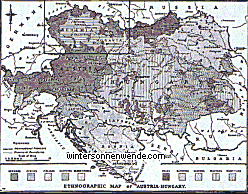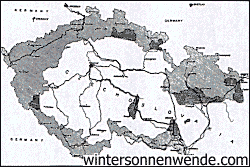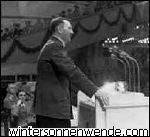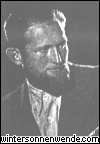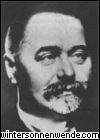 |
 George Henry Lane-Fox Pitt-Rivers Origin of the Czecho-Slovak Republic (cont'd.) Italy's pre-war attachment to the Central Powers in the Triple Alliance was always precarious and did not survive the outbreak of hostilities. Her ambitions and interests in the Adriatic and in the Southern-Slav bloc in fact conflicted with those of the Central Empires. Italy, even when she was our ally at the end of the War, never whole-heartedly entered into the plot so dear to the hearts of international revolutionists, to secure Czecho-Slovakia disguised in democratic trappings as a Trojan horse, to be pushed into the centre of Europe by troops of rose-garlanded enthusiasts for the League of Nations and elderly English professors waving olive branches, out of whose belly were to jump in the fullness of time fully armed Bolshevik warriors pledged to slay Nazi monsters and win Europe for "the permanent revolution." The Department of Propaganda recorded regretfully in 1920:
It is of special interest to-day to examine the Ethnographic Map of Austria-Hungary used by the British Department of Propaganda and published in his book by Sir Campbell Stuart in 1920. It is reproduced here and may be studied in relation to Herr Hitler's claims for the Sudeten Germans in the Godesberg Memorandum. The map also serves to illustrate forcibly how every guarantee of self-determination of minority peoples has been violated. It is the same map which was used and relied upon by Seton-Watson and Wickham Steed, Co-Directors of the Austro-Hungarian
Mr. Wickham Steed, whose weighty pronouncements always have priority in the columns of the Times, a priority apparently refused to all other dissentient experts, writing in its issue of October 10th, 1938, appeared to have forgotten his war-time service as Director of Propaganda in Enemy Countries. He writes:
He then relates that he was asked to return his Umgangssprache, or usual language of adoption, in the Census return of that year. He gave his nationality as British and informed the Austrian official that he habitually used the German language, and ironically adds to his account:
As a matter of fact, this was the Census which served as the basis of the ethnographic map of Austria-Hungary, used by Mr. Wickham Steed's propaganda department since 1918! That he confused or misled the Census officials has little bearing on the value or otherwise of the maps on which he himself afterwards relied. Foreigners are not, in any case, included in the ethnographic divisions of those maps. In my map of population foreigners are expressly excluded. Fortunately neither Mr. Wickham Steed nor Mr. Seton-Watson, nor any other of their former colleagues and members of the Serbian Society of Great Britain would have been eligible to vote in plebiscite areas. Mr. Wickham Steed may also be reminded that he himself relates how during the War he assisted an Austrian enemy subject, no less a one than ex-President Benesh of Czecho-Slovakia, to come to England on a forged Serbian passport, while he also records how his Co-Director of Propaganda, "Seton-Watson, once spent a lurid forty-eight hours saving Masaryk from arrest at Hampstead." Mr. Wickham Steed goes on to tell us in his book, Through Thirty Years (Vol. II, p. 100): "I felt it would be hopeless to explain to this worthy detective the intricacies of Austrian politics, and how an 'Austrian' might be in possession of a Serbian passport." We feel after this long lapse of time that Mr. Wickham Steed may also have equal difficulties in explaining the ethnology and the intricacies of Czecho-Bolshevik politics in the mixed areas of Czecho-Slovakia. May we not forgive the perplexity of an Austrian Census official in 1910 who appears to have understood Mr. Steed's ethnographic and political explanations no more clearly than did an English Detective-Inspector in 1917? As already noted, the spokesmen for the "Oppressed Hapsburg Nationalities" being the Serbian, Southern Slav, and Italian as well as the English representatives of our "anti-Austrian and German Department of Propaganda," in the persons of Messrs. Wickham Steed and Seton-Watson, at the Rome Congress in April, 1918, pledged themselves "to guarantee to such racial groups of one people, as it may be found necessary to include within the frontiers of the other, the right of their language, culture, and moral and economic interests." All the Allied Powers, except the U.S.A., declared, however, that Wilson's Fourteen Points and "self-determination" did not apply to the settlements with Austria and Hungary - nor to Germany, and, at the same time, they recognised Hungary as a separate power independent of Austria. On April 14th, Wilson agreed to grant Italy the Tyrol south of the Brenner Pass, with about 250,000 Germans, as well as the Trentino. Austria was reduced by about two-thirds of her German-speaking territories, which were distributed between her various Slav and Italian neighbours. Through the influence of M. Clemenceau the Allies decided to prohibit union between Austria and Germany, without, that is to say, the safe proviso embodied in the draft treaty with Germany of first obtaining the unanimous consent of the Council of the League. This proviso was embodied in Article 88 of the Treaty of St. Germain. There can be no doubt that South Tyrol, forcibly torn from her Northern other half by a new frontier at the Brenner Pass, owing to her annexation by Italy in 1919, lost most of that provincial autonomy which the Tyroleans, like all provinces in the old Hapsburg Empire, enjoyed under Austrian rule. Instead of an elected provincial council (Landtag), the truncated province was placed under administration of a prefect at Trent. Its administrative inclusion in the Trentino, the suppression of the German language, and the persevering attempts to Italianise the German-speaking people were for long deeply resented by the Tyroleans; but it was not until the national unification of Italy, under the leadership of Benito Mussolini and the inspiration of the fascist ideology, that good democratic propagandists and enthusiasts for the League of Nations started an agitation to ventilate the grievances of the Germans of the Tyrol.8 They ignored the fact that the Allied Powers and the League of Nations were alone responsible for handing over the South Tyrol to Italy, and they either ignore or else heartily approve the much greater sufferings of the far greater population of Germans handed over, against their will, to the tyranny of Czech and Serbian pirate states in the name of democracy. Similarly, they ignored the worse sufferings of the Northern Tyrol under a dictatorial usurpation of power inspired by Moscow or the Vatican city. After the German-Austrian Anschluss of March 1938, in response to the appeal of the overwhelming majority of Austrian Germans, had effected a common German-Italian frontier and, later, after the Sudeten Germans of Bohemia had been rescued from Czech tyranny, and German-Italian interests had been cemented in a common front against the world Bolshevik threat from Soviet Russia and her vassal Czech state and, finally, just when the position of the Tyrolean Germans of Oberbozen (Bolsano) had improved in the general atmosphere of German-Italian accord, world democracy was thinking and talking of self-determination only for the Southern Tyrol. This, then, was the occasion chosen for a hypocritically-voiced concern for the German-speaking South Tyroleans, when the interchange of German and Italian tourists, artificers, and workmen had reached a maximum; when Italian opera in Germany and German music in Italy were being increasingly popularised, I received this October, 1938, an illustrated edition de luxe of a propaganda pamphlet 9 informing me that in Italy "lectures and theatre performances conducted in German are generally prevented and films with a German text are forbidden, while the cafés are prohibited from tuning in
This speech of Hitler's was made on September 26th, 1938, the day on which the issue of peace or war between England and Germany was trembling in the balance. This was the day, it so happened, that the first edition of this small volume went to press in pamphlet form. It contained the evidence for the Sudeten case, which, for the first time, Herr Hitler pledged himself before the world to solve. This was the speech relayed from all Italian stations. Was there a single cry from these humanitarians to save the oppressed Tyroleans and the National Socialist majority in Austria from wholesale persecution, imprisonment, torture, and execution at the hands of dictator Dollfuss's government for the crime of professing their political faith and their passionate wish for union with their German kinsmen in the Reich?
Who, then, has a right to talk about the self-determination of the Tyroleans? Czecho-Slovakia was not the only monstrous political fraud perpetrated upon the helpless minority peoples of the dismembered Austro-Hungarian Empire - the other one was Yugoslavia by the incorporation into Serbia of Croatian, Macedonian, Hungarian, Slovakian, Dalmatian, and Montenegrin territories. The sufferings of the Croats and Slovenes under Serbian
Since 1928 the Croats, bowed under the Serbian heel, crippled by an ever increasing load of taxation, outlawed in their own land, have worked and plotted only for freedom from the Serbs. The civil war has continued ever since and the British public, which sends its tourists by the hundreds in luxury steamers to the Dalmatian coast, knows nothing of it.
An eminent English authority, an expert in Balkan ethnography, Miss Edith Durham, writes to me in a private letter, dated October 6th, 1938, which I am permitted to quote:
"She was not allowed to do so because Russia was behind the murderers and the death of the Archduke was determined upon at a meeting in Toulouse. Neither the French nor the Russians could afford to have the matter investigated by Austrian police. So we fought on the side of the murderers and now we are paying for it. "Austria was condemned to be destroyed and a pan-Slav heaven constructed out of its remains. Czech doctors, tourists, engineers, bankers all preached on this text. "Continuously for fourteen years before the War I spent a large part of my time among the Slav-speaking peoples of the Near East; I found the Czechs everywhere working a violent propaganda against the Austro-Hungarian Empire. Towards the end of the Balkan war I worked for a time in Montenegro under a Czech doctor. His persistent encouragement to the Montenegrins to annex all possible Albanian territory for the Slavs and his hopes that the Serbs would stick to Macedonia and not allow the Bulgars to claim any, so disgusted me that I left his hospital. "The Czechs, meanwhile, were working hand in glove with the Serb revolutionary gang, 'Black Hand,' which was conspiring to undermine Austria-Hungary and finally to precipitate the war by murdering the Archduke. A 'Black Hand' man told me enthusiastically that Masaryk had been their great friend. They started enlisting young Serbian and Croatian Austrian subjects to join their revolutionary work and break their oath of allegiance when doing their military service. He added that the cleverest thing Masaryk did was get away so soon as the thing was set going and to start propaganda in the U.S.A. and in England. In the U.S.A. he came in contact with the millionaire iron-master Charles Crane, and his son, Jan Masaryk, now Czech Minister in London, married Crane's daughter. This helped to spread Czech propaganda in the U.S.A., where Crane had great influence. "I have sent much of this information to the Press but have failed to get it printed. Lastly, we allowed the Czechs to subsidise London University. A big university should surely be above accepting propaganda pay."10 It is a matter of history and common knowledge that on July 23rd, 1914, at six o'clock in the afternoon, the Austro-Hungarian Minister to the Court of King Peter of Serbia presented the famous note to the Serbian Government at Belgrade, demanding inter alia that judicial proceedings should be taken against the accessories to the plot of June 28th, 1914, who are on Serbian territory, which resulted in the murder of the Austrian heir to the throne, and that delegates of the Austro-Hungarian Government should take part in the investigation. A reply was demanded within forty-eight hours. War was declared on July 28th. What is not so well known is the part played by the "Black Hand" of Serbia and the pan-Slav terrorist organisation known as the "Narodna Odbrana", whose responsibility for the murder is declared in the Austrian Note, and other connected secret societies, who were responsible for bringing about the war in the revolutionary interests. What is also not so well known is the collaboration which existed, and which has continued ever since, between Serbian and Czech secret terrorist organisations. It is therefore of interest and great importance to find recorded in official or semi-official Czech publications evidence of these activities. In a book published by the official Orbis Publishing House in Prague, in 1928, entitled The Czechoslovak Nation's Struggle for Independence, by Jaroslav Papousek, it is stated and here quoted in a slightly abridged form, that on the outbreak of war Professor Masaryk,
If, possibly, the modern state of Czecho-Slovakia was not actually conceived in America it is certainly no exaggeration to say that it was incubated, hatched, nourished, and finally canned for export to Bohemia, Moravia, and Slovakia by its American foster-parents, in time for the baptismal celebrations after the War to end War, at which France, and her ally England, as proxy for Bolshevik Russia, stood sponsors at the front of the League of Nations. Czecho-Slovakia in truth was actually born in America on May 30th, 1918, at Pittsburg, and announced to the world by the "Pittsburg Pact", signed by T. G. Masaryk and others. The text read as follows (translated from the Slovakian language):
"We agree to the political programme which endeavours to bring about a unity of Czechs and Slovaks in an independent state of the lands of Bohemia and Slovakia. "Slovakia shall have its own government, parliament, and laws. The Slovak language shall be the official language in the schools, amongst officials and in public life. "The Czecho-Slovak State shall be a republic, and its constitution shall be democratic. The organisation of co-operation between Czechs and Slovaks in the U.S.A. shall be studied and improved in the light of requirements and changing conditions in an atmosphere of mutual understanding. "The details of the formation of the Czecho-Slovak State shall be reserved for the freed Czechs and Slovaks and their legal representatives." Signed by T. G. Masaryk and the other
signatories.12 Previous to the Pittsburg Pact, an International Masonic Congress, held under the auspices of the Grand Orient and Grand Loge de France in June, 1917, took place in Paris. At this Congress resolutions were put forward for the promotion of a League of Nations. The Czech agents in Paris, in pursuance of the policy of Professors Masaryk and Benesh, supported a resolution proclaiming the proximate foundation of a Czech state.13 Because, in its early stages, Czecho-Bolshevik collaboration was organised and conducted in secret lodges and at secret meetings of revolutionary and terrorist organisations of which the evidence has taken years to come to light, and has then been systematically suppressed, particularly in England, the real purpose of the activities of Professors Masaryk and Benesh was hidden from the world. The most irrefutable evidence, however, can now be quoted from the organs of the international revolutionary movement and the Comintern. In pursuance of Czecho-Bolshevik plans the Czechs betrayed national Russia in Siberia at the end of the War and received as a quid pro quo for the betrayal of Kolchak a free passage and other benefits from the Bolsheviks. Between the formation of the Czech state and the Bolshevik October Revolution of 1917 there is a close dependency, as can well be seen from Kopensky's account in the Communist International, the central organ of the Comintern, of July 7th, 1937:
"The close historical connection between the proletariat and the October Revolution in the Soviet Union has strengthened the revolutionary Communist movement."14 |





